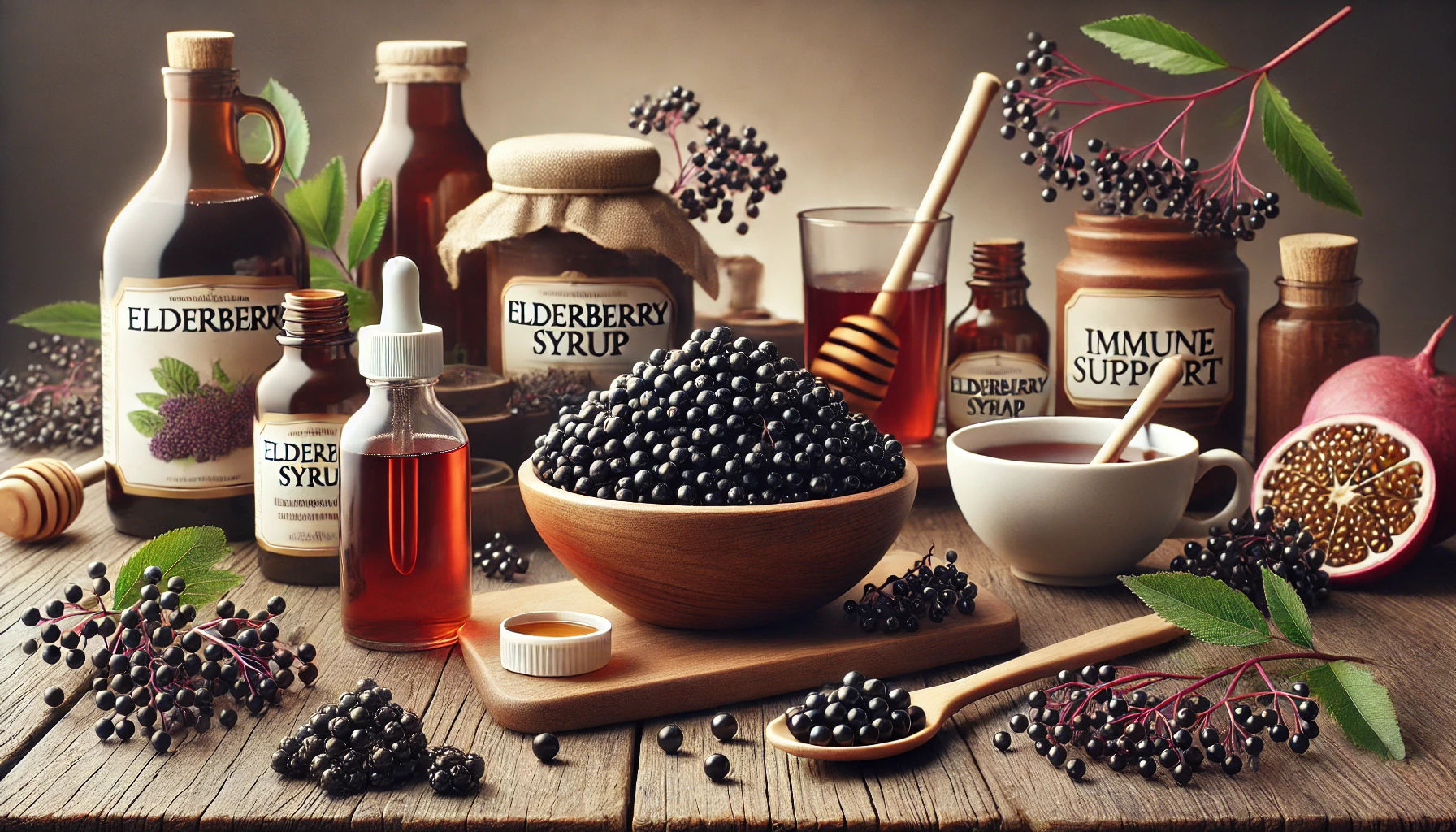Introduction
Elderberry has been used for centuries as a natural remedy to support the immune system, fight infections, and promote overall health. With its rich antioxidant content and powerful antiviral properties, elderberry has gained attention as a go-to supplement for preventing colds and flu.
In recent years, elderberry-based supplements such as syrups, teas, capsules, and gummies have become widely popular. People swear by its ability to reduce the severity and duration of colds and flu, but does science back up these claims?
In this article, we’ll explore the research behind elderberry, how it boosts immunity, the best ways to consume it, and whether it can truly help prevent seasonal illnesses.
1. What Is Elderberry?
Elderberry comes from the Sambucus nigra plant, commonly known as black elderberry. The berries and flowers of this plant have long been used in folk medicine to treat respiratory infections, inflammation, and fever.
📌 Nutritional Profile of Elderberries (per 100g):
✔ Vitamin C – A key nutrient for strengthening immune defense.
✔ Anthocyanins – Powerful antioxidants that help fight oxidative stress.
✔ Flavonoids – Plant compounds with antiviral, antibacterial, and anti-inflammatory effects.
✔ Dietary Fiber – Essential for gut health, which plays a major role in immune function.
🔹 Fact: Elderberries contain more antioxidants than blueberries, cranberries, and blackberries, making them one of the most nutrient-rich berries for immune health.
2. How Elderberry Supports the Immune System
Elderberry contains bioactive compounds that help the body fight infections, reduce inflammation, and recover faster. Several studies suggest that elderberry may:
✔ Reduce the severity and duration of colds and flu – Its antiviral properties help slow down virus replication in the body.
✔ Stimulate immune response – Increases cytokine production, which helps white blood cells fight infections more effectively.
✔ Lower inflammation – Antioxidants in elderberry help neutralize free radicals and prevent excessive inflammation, which weakens the immune system.
🔹 Scientific Evidence: A study published in the Journal of International Medical Research found that elderberry extract reduced flu symptoms by up to 4 days compared to a placebo.
Another study in the Nutrients journal found that elderberry extract helped reduce the duration and severity of upper respiratory symptoms in travelers.
3. Can Elderberry Prevent Colds and Flu?
While elderberry cannot completely prevent colds and flu, research suggests that it may lower the risk of infections and reduce symptom severity by:
✔ Blocking viruses from entering cells – Flavonoids in elderberry prevent viruses from attaching to healthy cells, stopping infections before they spread.
✔ Enhancing immune response – Elderberry strengthens the body’s natural defenses, helping it fight off infections more efficiently.
✔ Reducing symptom severity – Elderberry can help relieve nasal congestion, coughing, fever, and sore throat, making recovery quicker and less uncomfortable.
🔹 Fact: Elderberry is most effective when taken at the first signs of illness, as it helps the body react quickly to infection.
4. Best Ways to Consume Elderberry
Elderberry is available in various forms, making it easy to incorporate into your daily routine:
🍷 Elderberry Syrup
✔ The most popular form, often mixed with honey.
✔ Suitable for both adults and children (with proper dosage).
✔ Can be used as a preventive measure and for symptom relief.
💊 Elderberry Capsules
✔ Convenient for daily immune support.
✔ Ideal for traveling and busy schedules.
✔ Provides a standardized dose of elderberry extract.
🍵 Elderberry Tea
✔ A soothing option, especially when combined with ginger and honey.
✔ Helps relieve sore throat, congestion, and flu symptoms.
✔ Perfect for winter and seasonal changes.
🍬 Elderberry Gummies
✔ A tasty way to get immune-boosting benefits.
✔ Often fortified with Vitamin C and Zinc for added protection.
✔ Great for kids and those who dislike syrups or capsules.
🔹 How to Use Elderberry Effectively:
✔ Take elderberry syrup or capsules daily during flu season.
✔ Drink elderberry tea when feeling under the weather.
✔ Use elderberry extract as a preventive measure during travel or high-risk seasons.
5. Are There Any Side Effects?
Elderberry is generally safe when consumed in the recommended doses, but there are some precautions:
🚨 Raw Elderberries Can Be Toxic
⚠ Raw elderberries contain cyanogenic glycosides, which can cause nausea, vomiting, and diarrhea. Always consume cooked or processed elderberry products.
🚨 Who Should Avoid Elderberry?
⚠ People with autoimmune diseases – Elderberry stimulates the immune system, which may worsen conditions like lupus, rheumatoid arthritis, or multiple sclerosis.
⚠ Those taking immune-suppressing medications – Elderberry may interfere with certain drugs.
⚠ Pregnant or breastfeeding women – Consult a doctor before using elderberry supplements.
🔹 Tip: If you take medications, consult a healthcare professional before adding elderberry to your routine.
6. Conclusion: Is Elderberry Worth It?
Elderberry is a powerful natural remedy that can help reduce the severity and duration of colds and flu. While it may not completely prevent infections, its antiviral, immune-boosting, and anti-inflammatory properties make it a great addition to a healthy lifestyle.
✅ Key Takeaways:
✔ Elderberry is rich in antioxidants, flavonoids, and Vitamin C, all essential for immune function.
✔ Scientific studies suggest that elderberry extract may shorten the duration of colds and flu.
✔ Taking elderberry at the first signs of illness is the most effective way to experience its benefits.
✔ There are multiple ways to consume elderberry, including syrup, tea, capsules, and gummies.
✔ Always consume cooked or processed elderberry to avoid toxicity.
🔹 Question: Have you ever used elderberry for immune support? Share your experience in the comments!
